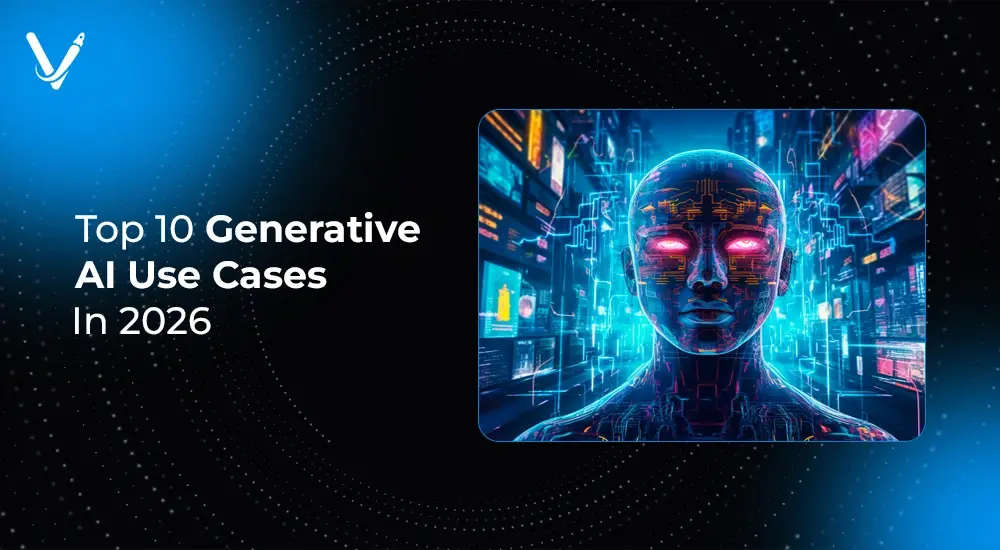Top 10 Generative AI Use Cases in 2026


- Apr 8, 2025
Generative AI has transformed industries across the globe, revolutionizing the way businesses, researchers, and creatives operate. In 2026, its impact has grown even more profound, spanning across content creation, healthcare, software development, education, gaming, finance, legal sectors, and beyond. By leveraging machine learning models, AI can now generate human-like text, realistic images, videos, and even scientific discoveries, pushing the boundaries of what is possible.
The rapid adoption of generative AI is driven by the need for automation, personalization, and efficiency. Businesses that integrate AI solutions are achieving greater productivity, reducing costs, and unlocking new revenue streams. In this in-depth article, we will explore the top 10 generative AI use cases in 2026 and how they are shaping the future of multiple industries.
Generative AI is deeply embedded in our daily lives, often without us even realizing it. Beyond crafting romantic verses, offering cleaning hacks, or planning international trips, GenAI provides a wealth of business advantages across various industries. In this post, we’ll explore how generative AI is transforming the business landscape.
At its core, generative AI refers to a category of artificial intelligence models designed to generate new content—whether text, images, music, code, or more—based on input data. Unlike traditional AI, which primarily focuses on pattern recognition and decision-making, GenAI leverages Machine Learning (ML) to produce original outputs that mirror human creativity.
The power of GenAI comes from Large Language Models (LLMs) like OpenAI’s GPT-4, Anthropic’s Claude, and Google’s Gemini. These models are trained on vast amounts of publicly available data, enabling them to generate contextually relevant responses.
To enhance accuracy and personalization, businesses integrate the GenAI framework known as Retrieval-Augmented Generation (RAG). This approach enriches enterprise LLMs with private, internal data from trusted AI development company sources, ensuring more relevant and tailored outputs.
Generative AI isn’t new—it dates back to the 1960s. However, its mainstream breakthrough came in late 2022 with the launch of ChatGPT. Since then, AI has become nearly ubiquitous.
Here’s why:
Technological Advancements – Innovations in deep learning, cloud computing, and AI-specific hardware (like TPUs) have made AI more powerful and accessible.
Increased Computing Power – Companies like Nvidia and Intel have developed specialized chips, enabling AI models to process massive datasets efficiently.
The Internet Effect – Social media, blogs, and online news have amplified AI awareness, fueling adoption and innovation.
Business Adoption – AI boosts efficiency, personalization, and decision-making. With 97% of businesses recognizing its value, it's now a key competitive advantage.
Generative AI in digital transformation is driven by a mix of technological breakthroughs, market demand, and widespread digital influence—making it a defining force in today's tech landscape. 🚀
Generative AI operates by recognizing patterns in existing data and using those patterns to generate new content. At its core, it relies on neural networks—interconnected nodes that function similarly to neurons in the human brain. These networks process input data, make predictions, and continuously learn to refine their outputs.
The essence of generative AI lies in its ability to anticipate the next element in a sequence. This could be the next word in a sentence, a musical note in a composition, a pixel in an image, or even the next line of code in a program.
The process begins with feeding a neural network vast amounts of data, which may include:
Once ingested, this data is processed through transformers—advanced AI architectures that convert raw information into vector embeddings (numerical representations). These vectors are then mapped in a multidimensional space, allowing the AI to classify and generate outputs based on their relationships and similarities.
This sophisticated mechanism enables generative AI to produce remarkably human-like and context-aware content across various domains.
Generative AI continues to evolve, transforming industries with innovative applications. Here are the top 10 use cases in 2026:
The digital marketing landscape has undergone a major transformation with the integration of AI-powered content generation tools. Marketers and content creators leverage platforms like Jasper AI, Writesonic, and OpenAI’s GPT models to automate and optimize content creation processes.
Applications:
Impact:
Generative AI enables businesses to scale content production while maintaining high quality and personalization, driving higher engagement and sales.
The software industry has experienced a revolution with AI-driven coding assistants like GitHub Copilot, OpenAI Codex, and Amazon CodeWhisperer. These AI models assist developers in writing, debugging, and optimizing code, significantly improving productivity.
Applications:
Impact:
AI-powered coding tools reduce development time, enhance code quality, and enable businesses to bring products to market faster.
Generative AI has accelerated advancements in medical research, diagnostics, and patient care. AI-powered models are now capable of predicting disease patterns, designing new drugs, and generating personalized treatment plans.
Applications:
Impact:
The healthcare industry benefits from faster drug development, improved diagnostics, and personalized care, leading to better patient outcomes.
AI is pushing the boundaries of creativity by generating stunning artwork, composing original music, and enhancing video production.
Applications:
Impact:
AI democratizes creativity, allowing individuals and businesses to produce high-quality visual and audio content effortlessly.
The education sector is leveraging AI to create personalized learning experiences tailored to individual student needs.
Applications:
Impact:
Generative AI makes education more accessible, engaging, and effective for students across different learning styles and backgrounds.
Gaming companies are integrating generative AI to create immersive, intelligent, and dynamic gaming experiences.
Applications:
Impact:
AI-driven gaming experiences create more engaging and interactive environments for players.
Businesses and financial institutions use AI to automate workflows, improve decision-making, and optimize financial operations.
Applications:
Impact:
Businesses improve efficiency, reduce costs, and enhance financial decision-making with AI-driven automation.
Law firms and compliance teams use AI to automate legal documentation and ensure regulatory compliance.
Applications:
Impact:
AI enhances legal efficiency, reducing workload and increasing accuracy in legal operations.
AI is playing a crucial role in urban planning and sustainability efforts.
Applications:
Impact:
Smart cities become more efficient, sustainable, and environmentally friendly.
AI accelerates research in multiple scientific domains, driving innovation and discovery.
Applications:
Impact:
Generative AI accelerates scientific progress, leading to groundbreaking discoveries.
Generative AI is revolutionizing industries, driving efficiency, innovation, and growth. To stay ahead in the AI-driven world, businesses need secure AI solutions. Vasundhara Infotech specializes in AI-powered, secure software solutions.
Contact us today to integrate AI-driven solutions into your business and transform your operations for the future.
Copyright © 2026 Vasundhara Infotech. All Rights Reserved.
